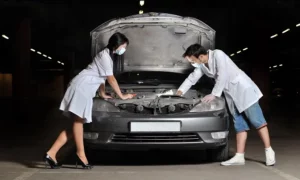European cars are renowned for their luxurious designs, advanced engineering, and timeless style. Whether you’re driving a classic BMW, a sleek Audi, or the always-elegant Mercedes-Benz, owning a European vehicle often means indulging in an extraordinary driving experience. However, maintaining and repairing these vehicles comes with its own set of challenges.
This guide is designed to help European car owners understand the nuances of European auto repair, including why specialized care is essential, common issues to look out for, and how to keep your car running smoothly for years to come.
Why European Cars Require Specialized Repair
European cars are engineered differently compared to many American or Japanese vehicles, and this distinction plays a significant role in their repair and maintenance requirements. Here’s why specialized care is essential:
Advanced Engineering and Precision
European vehicles are built with meticulous attention to detail and cutting-edge technology. For example, brands like Volvo and Porsche incorporate highly specialized systems that often require specific tools and expertise to diagnose and repair properly.
Unique Parts and Components
Many European cars use exclusive parts that are not readily available in standard auto shops. Components are often sourced directly from the manufacturer or certified suppliers, which can lead to higher costs and longer shipping times without a reliable repair provider.
Diagnosing Complex Systems
European vehicles feature advanced computer systems for diagnostics and performance monitoring. While this enhances driving efficiency and safety, it also demands specialized diagnostic tools to properly interpret error codes and warnings.
Warranty Preservation
To preserve your vehicle’s warranty, many European car manufacturers require servicing and repair work to be done by certified auto shops. Choosing the wrong repair service could void your warranty and result in additional long-term costs.
Common Issues European Car Owners Face
European auto repair often involves addressing issues specific to luxury brands. Here are the most common problems and what to watch out for:
Electrical Problems
European cars frequently experience electrical issues due to their advanced systems. Problems like malfunctioning sensors, faulty wiring, or central console issues are common, especially in models like the BMW 3 Series and Audi Q7.
Tip: If you notice flickering lights, error messages on the dashboard, or malfunctioning controls, have the system scanned at a specialized repair shop immediately.
Oil Leaks
Many European engines are prone to oil leaks over time, especially in older vehicles like the Mini Cooper or Volkswagen Passat. Valve cover gaskets and oil pans are often the culprits.
Tip: Regularly check for oil stains under your car or a burning oil smell while driving, and address leaks promptly to prevent engine damage.
Transmission Repairs
High-performance European transmissions like DSG (Direct Shift Gearbox) in Volkswagen or ZF transmissions in BMWs are sophisticated but can be prone to issues such as jerking, slipping, or delayed gear shifts.
Tip: Have the transmission fluid checked every 30,000–50,000 miles and ensure maintenance is performed by a transmission specialist with European car expertise.
Suspension Wear and Tear
European luxury cars prioritize comfort, but their suspension systems, including air suspensions in Mercedes-Benz models, can wear out faster than their counterparts in standard vehicles.
Tip: If you feel unusual vibrations, uneven handling, or hear clunking noises, don’t wait to have your suspension analyzed and repaired.
How to Choose the Right European Auto Repair Shop
Finding the right repair shop can make a significant difference in how well your car is maintained and how much you’ll spend in the long run. Here’s what to look for:
Certified Technicians
Always choose a shop with certified technicians who specialize in European cars. Certifications like ASE Master Technician or manufacturer-specific credentials (e.g., Mercedes-Benz Certified) indicate expertise in handling European vehicles.
Access to Specialized Tools
Ensure the repair shop uses manufacturer-approved diagnostic equipment and tools designed for your specific make and model. Without these, even routine repairs can fall short of your car’s complex requirements.
Genuine Parts
Avoid shops that use generic or aftermarket parts instead of Original Equipment Manufacturer (OEM) parts. OEM parts are designed specifically for your vehicle and ensure optimal performance and longevity.
Positive Reviews and Reputation
Look for repair shops with excellent customer reviews, especially those mentioning European car expertise. Personal recommendations from fellow European car owners are also invaluable.
Competitive Pricing
European auto repair is often more expensive, but that doesn’t mean you have to overpay. Request detailed estimates and shop around for reputable services that offer transparent pricing.
Proactive Tips to Extend Your Vehicle’s Lifespan
Taking care of your European car doesn’t have to feel overwhelming. Here are some proactive tips to keep your vehicle in top condition:
Follow the Manufacturer’s Maintenance Schedule
Regular servicing is critical to keeping your car in peak condition. Look for maintenance schedules in your vehicle’s manual and stick to them. This typically includes oil changes, brake inspections, and timing belt replacements at manufacturer-recommended intervals.
Use Premium Fuel and Fluids
Many European cars require premium-grade, high-octane fuel and specialized fluids to function optimally. Using lower-quality alternatives could lead to long-term damage.
Warm Your Engine in Cold Weather
Allow the engine to warm up for a few minutes before driving in extremely cold temperatures to protect the engine components and fluids.
Monitor Warning Lights
Don’t ignore warning lights on your dashboard, even if the issue seems minor. These systems are designed to catch potential problems early, and addressing them promptly can save you from bigger issues down the line.
Store Your Vehicle Properly
For luxury vehicles like European sports cars, proper storage is key. Keep your car in a climate-controlled garage whenever possible to protect it from extreme weather and excessive moisture.
Why Specialized European Auto Repair Matters
Cars such as BMW, Audi, and Mercedes-Benz offer professional-level performance and comfort. It only makes sense to entrust their care to specialists trained to service these precision machines. Specialized repair shops with the right tools, knowledge, and commitment to quality will not only ensure your vehicle remains in pristine condition but also inspire confidence every time you drive.
Your European car deserves the best care available. By partnering with the right repair specialists and taking proactive measures, you can enjoy a smoother, safer, and more luxurious driving experience for years to come.

































